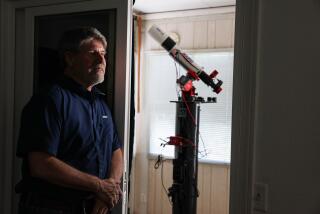Astronomer asks physicists what drives them to search universe

Hunting for dark matter and dark energy might seem like a losing game to the layperson. Why look for such strange, mysterious stuff, given the heavy costs to build instruments to find them and the seemingly slim chances of discovery?
Turns out scientists wonder that about one another too.
“Philosophically, what gets you putting so much time and effort … into such a low-probability game?” said Jay Pasachoff, a Williams College astronomer, to a panel of physicists Wednesday at the American Astronomical Society meeting in Long Beach.
Judging by the torrent of research discussed at the conference, discoveries of alien worlds -- particularly from the planet-hunting Kepler mission -- seem to be booming, said Pasachoff, who had presented his work on Venus earlier this week.
Finding clues about the nature of dark matter or dark energy, on the other hand, seems less likely by comparison, rather like looking for the shadow of an invisible needle in a haystack the size of a skyscraper.
“Do you lie awake at night wondering if you should be looking for something positive?” Pasachoff asked the physicists.
Douglas Finkbeiner of the Harvard-Smithsonian Center for Astrophysics had a quick answer for Pasachoff.
“We should all be laying in bed awake at night wondering what dark matter is,” Finkbeiner said.
Finkbeiner was one of those who presented a ‘negative’ result: His work threw some cold water on the buzz over what appeared to be a dark-matter signal.
Looking for strange signals and new particles may seem like exceedingly small fry, he said, but they’re the key to a larger truth.
“It’s not just one new particle and we’re done,” he explained. “Hopefully there are new forces in the dark sector. … It could be a whole new branch of physics, and we just don’t know until we look.”
Rodger Thompson of the University of Arizona pointed out that astrophysicists looking deep into the past may not even be playing with the right rulebook.
“We are testing whether our laws of physics might be significantly different in the early universe than they are now,” he said.
Answering that question, whether it proves current physicists right or wrong, “is a very positive result, so I feel very encouraged by this that we’re making a difference,” he said.
Robert Nemiroff of Michigan Technological University, who had the last word on the subject, put those exoplanets in their place.
“The Kepler people are doing a great job,” he said, “but we’re really at the base fundamental physics of the universe.”
Follow me on Twitter @aminawrite.







